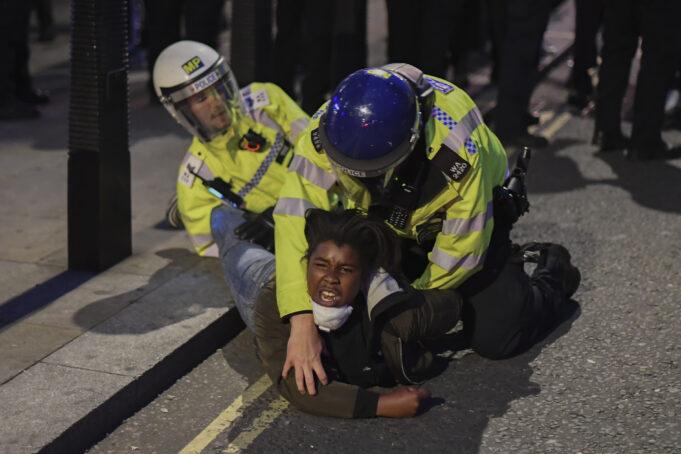Police in London have strip-searched 650 mostly Black children—most of whom were found to be innocent of the suspicions against them—over a two-year period, the UK’s children’s commissioner says.
Slamming the Metropolitan Police (Met’s) record on child protection, Commissioner Dame Rachel de Souza said in a report released on Aug. 8 that she was not convinced that the force was “consistently considering children’s welfare and wellbeing,” after police data showed that in almost a quarter of cases, an appropriate adult was not present during the search, despite this being a requirement under statutory guidance.
Commissioner De Souza further highlighted the ethnic disproportionality of the strip-searches after the data showed that of the children aged 10 to 17 who had been subjected to such searches between 2018 and 2020, almost three out of five (58 percent) had been Black. For 2018 alone, the figure was 75 percent.
She also questioned how such an “intrusive and traumatizing” practice was necessary after figures indicated that in 53 percent of the cases no further action had been taken. “This low level of successful searches arguably indicates that this intrusive practice may well not be justified or necessary in all cases.”
The revelations in the report led to the widespread belief that the Met has been involved in “state-sanctioned” child abuse and the dehumanizing of children, and another example of institutional racism plaguing Britain’s largest police force.
The damning report further raised concerns about “a lack of appropriate oversight” of police practice surrounding strip-searches after the data revealed that in one in five cases, there was no way of knowing where it even took place.
Out of the 269 strip searches of minors in 2021 for which the location of the search was recorded, 57 percent took place at a police station and 21 percent at a home address, according to the report, which goes on to say that 22 percent of the degrading searches had been conducted at “another location” but “due to the low quality of recording practice, it is not possible to determine where these searches took place.”
The data showed the number of searches increased steadily between 2018 and 2020, with 18 percent of all searches carried out in 2018, 36 percent in 2019, and 46 percent in 2020. Almost all of the kids strip-searched were boys (95 percent), and a quarter were 15 or younger.
The commissioner launched her investigation following widespread outrage over the case of Child Q, a 15-year-old schoolgirl who was strip-searched by female Met officers in 2020 after she was wrongly suspected of carrying cannabis at her east London school.
The strip-search triggered days of protests in London after it emerged the schoolgirl had been searched without another adult present and despite knowing that she was menstruating. Her parents were not contacted.
Commissioner De Souza emphasized that she was “deeply shocked and concerned” after requesting the data from the Met police using her powers under the Children and Families Act, saying, “I am also extremely concerned by the ethnic disproportionality shown in these figures, particularly given that ethnicity was determined to be such a key factor in the Child Q case.”
“I am not reassured that what happened to Child Q was an isolated issue, but instead believe it may be a particularly concerning example of a more systemic problem around child protection within the Metropolitan police. I remain unconvinced that the Metropolitan police is consistently considering children’s welfare and wellbeing.”
She now plans to seek the same data from all police forces.
“This report is about state-sanctioned child abuse operating outside the law,” said executive director of the London-based Inquest human rights charity, Deborah Coles as quoted in a report by The Guardian. “It also reveals racist and discriminatory policing and the dehumanizing of Back children.”
The president of the National Black Police Association, Andy George, also censured the racial bias in London’s police force, saying, “We continue to see these patterns of bias which always fall against Black communities. Most officers do not go about their duties believing they are doing harm, but because of systemic matters such as culture, training and a lack of representation, they are consistently treating Black communities disproportionately.”
George further underlined, “The Met police continue to exacerbate the low confidence from the Black community in the UK, and the new commissioner must admit the systemic nature of racism which manifests in the Met to ensure meaningful measures are developed to tackle the lack of trust and confidence.”
Met police, however, appeared to be in denial of the serious findings, claiming in a statement, “The Metropolitan police is progressing at pace work to ensure children subject to intrusive searches are dealt with appropriately and respectfully.”
“We have already made changes and continue to work hard to balance the policing needed for this type of search with the considerable impact it can have on young people,” the force said. (PressTV.ir)













